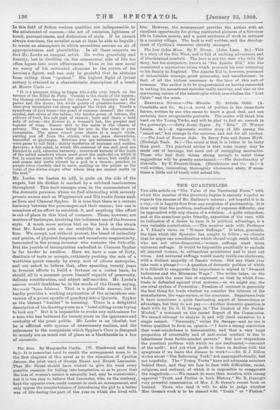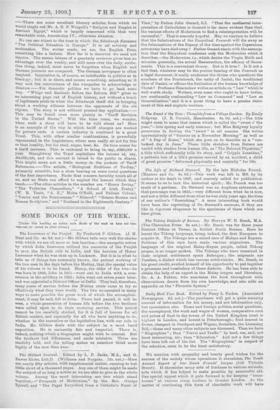THE QUARTERLIES.
Tan able article on " The Value of the Territorial Force " with which this number of the Quarterly begins is scarcely hopeful as regards the success of Mr. Haldane's scheme ; yet hopeful it is in a way,—it is happily free from any suspicion of partisanship. It is thus only that the problem; confessedly of supreme difficulty, can be approached with any chance of a solution, A quite outspoken, and at the same time quite friendly, exposition of the case, with no indication of a desire to turn it to political advantage, is a very valuable contribution.—The number ends with Professor A. V. Dicey's views on " Woman Suffrage." It takes, generally, the lines which the Spectator has sought to follow ; we observe that he urges one consideration which should weigh much with all who are not ultra-democrats,—woman suffrage must mean, universal suffrage. It would be impossible practically to exclude all married women, to enfranchise prostitutes and to shut out wives. And universal suffrage would nearly treble our electorate, with a distinct majority of female voters. Did any State ever take such a plunge P—A question of domestic politics of which it is difficult to exaggerate the importance is argued in " Sweated Industries and the Minimum Wage." The writer takes, on the whole, much the same line of argument as that by which Free- trade is defended against rival systems,—or, we might say, the one rival system of Protection : Freedom of contract is generally the best thing for trade whether we consider the interest of the manufacturer, the wage-earner, or the consumer. Departures from it have sometimes a quite fascinating aspect of benevolence or advantage, but they do not pay.—Another domestic question is dealt with by Dr. G. H. Savage in "The Control of the Feeble- Minded," a comment on the recent Report of the Commission. We cannot attempt to analyse it, and will limit ourselves to a single remark. " Personally," writes Dr. Savage—and no one is better qualified to form an opinion—" I have a strong conviction that weak-mindedness is transmissible, and that a very large proportion of criminality and of anti-social conduct is due to inheritance from feeble-minded parents." But how stupendous the practical problem with which we are confronted.—restraint of the unfit 1 And yet what profit is there in dealing with the symptoms if we leave the disease to work P—Dr. E. J. Dillon writes about " The Reforming Turk," not unsympathetically, but not hopefully. The "Young Turks" have not adequate numbers behind them, and they are face to face with difficulties, racial, religious, and cultural, of which it is impossible to exaggerate the magnitude.—We cannot do more than mention with strong approval "Truth and Fiction in Irish History," Mr. R. Dunlop's very powerful examination of Mrs. J. R. Green's recent book on Ireland, Those who read it will be able to judge whether Mrs. Green's work is to be classed with "Truth" or "Fiction." --There are some excellent literary articles, from which we Would single out Mr. A. E. P. Weigall's "Religion and Empire in Ancient Egypt," which is largely concerned with that very remarkable man, Amenhotep IV., otherwise Aknaton.
No one can object to the tone in which the Edinburgh discusses "The Political Situation in Europe." It is all sobriety and moderation. The writer reads, we see, the English Press something like a lecture. How far it is deserved we need not inquire. The serene leisure of a quarterly reviewer gives him an advantage over the weekly, and still more over the daily, scribe. One thing, indeed, must never be forgotten when English and German journals are compared. The German newspaper is often inspired. Inspiration is, of course, as indefinable in politics as in theology ; but it is there, and means something, according as it may suit the convenience of the wirepuller to acknowledge or disavow.—For domestic politics we have to go back some way. " Whigs and Radicals Before the Reform 13111" gives us an interesting page out of English history, not without a touch of legitimate pride in what the Edinburgh itself did in bringing about a working alliance between the opponents of the old regime. The story is not without present-day application.— This may be found even more plainly in "Tariff Revision in the United States." Will the time come, we wonder, when such a story will have to be told about us ? Here is an example of the way in which tariff changes are worked for private ends. A certain industry is combined in a great Trust. This, with other similar combinations, is powerfully represented in the Legislature, where men really sit not for this or that locality, but for steel, sugar, beer, des. Its turn comes"for a tariff increase. This is reckoned to bring in, say, ..£200,000 a year. Straightway the Trust capitalises the income at, say, X4,000,000, and this amount is issued to the public in shares. This might mean not a little money in the pockets of Tariff Reformers.—The article, "Biological Problems of To-Day," primarily scientific, has a close bearing on some social questions of the first importance. Facts that concern heredity touch all of us, and no State can afford to neglect the lessons which they teach.—The other articles in the number are "Henry Irving," "The Victorian Chancellors," "A School of Irish Poetry" (W. B. Yeats, "A. E.," Moira O'Neill, and Padraic Colum), "Venice and the Renaissance," " Nimrod," "Graeco-Roman and Roman Sculpture," and " Scotland in the Eighteenth Century."







































 Previous page
Previous page